What is Pomapoo Dog
The Pomapoo is one of the smallest designer crossbreeds. It is one of the few companion breed hybrids becoming increasingly popular, with good cause. The Pomapoo comprises two lovely toy dogs: the Pomeranian and the Toy Poodle.
Compact, intelligent, and affectionate, these pups inherited some of their parents’ best qualities. Pomapoos are also called Pooranian, Pompoo, and Pomeroodle.
The Pomapoo can be the first cross, with one Pomeranian and one Poodle parent, or they can be two Pomapoos bred together. Still, in-breeding can be a concern in this instance. This implies differences in shape, color, and coat type.
Still, this crossbreed is about tiny, pleasant companion dogs in all cases. A Pomapoo’s disposition may vary due to its mixed-breed status, but they are generally quite friendly.
What Does Pomapoo Dog Look Like?
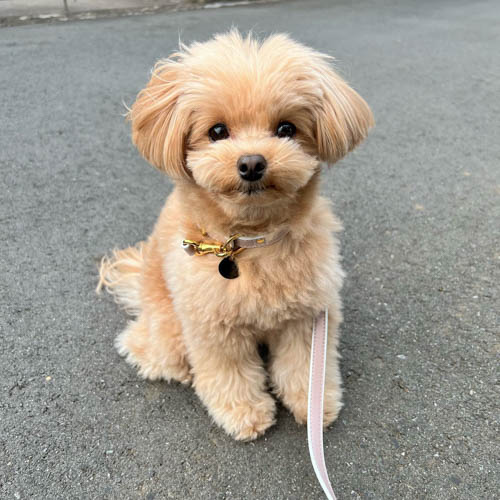
Pomapoos are a mixed breed; their looks might vary greatly depending on whatever combination of gorgeous features their parents pass on. On average, these little dogs weigh 5–15 pounds, with male Pomapoos being somewhat bigger.
Perky Poms feature cartoonish grins, a buoyant swagger, trapezoidal ears, a plumed tail, and a fluffy-but-thick double coat. Frills around their necks and chests give them the appearance of proud tiny lions, and their eyes are black yet brilliant.
On the other hand, Poodles have a curled low-allergen coat, a square physique, dark oval eyes with an intelligent look, and a refined disposition.
In other words, one Pomapoo may be distinguished by the animated appearance, whilst the animated appearance may distinguish another. Pomapoo coats can also vary greatly in color, texture, and pattern.
These puppies can be red, brown, black, cream, brindle, apricot, sable, white, black and white, silver, blue, grey, tan, orange, fawn, or any nearly infinite variety of colors combinations.
Pomapoo coat types include long, coarse, thick, shedding coats and curly and hypoallergenic coats. The coat might potentially be a mix of the two.
Pomapoo’s eye color is brown.
Because their hair is prone to matting, a regular brushing program can help maintain their coats tangle-free in grooming sessions. While no dog is hypoallergenic, Pomapoos may be low-allergen if they inherit the toy poodle coat.
Pomapoo Dog Temperament
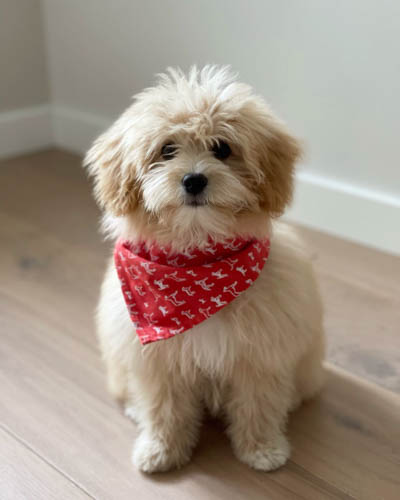
Poodles are quick to learn and extremely intelligent. Poms are energetic, curious, and outgoing. When the two breeds are combined, the result is generally a Pomapoo that is intelligent and affectionate, loves to be the center of attention, and is ready to learn new tricks.
Like their Pomeranian parents, these energetic dogs have a talent for entertaining their human companions and crave playtime. “Pomapoos are clever, loving, and friendly dogs to strangers, children, and other animals.”
However, their small stature and delicate body may not be suitable for families with young, rough-housing children who may inadvertently damage these little guys. When playing with any dog, children should always be supervised.
How Big Do Pomapoo Dog Get?
Pomapoo is a relatively new breed; there are limited size criteria. However, because Pomapoos are a cross between Pomeranian and Toy Poodle parents, they are likely to be on the little side. Pomapoos have a lifetime of 12–15 years.
- Male dog height ranges from 8 to 10 inches
- Female dog height ranges from 8 to 10 inches.
How Much Do Pomapoo Dog Weigh?
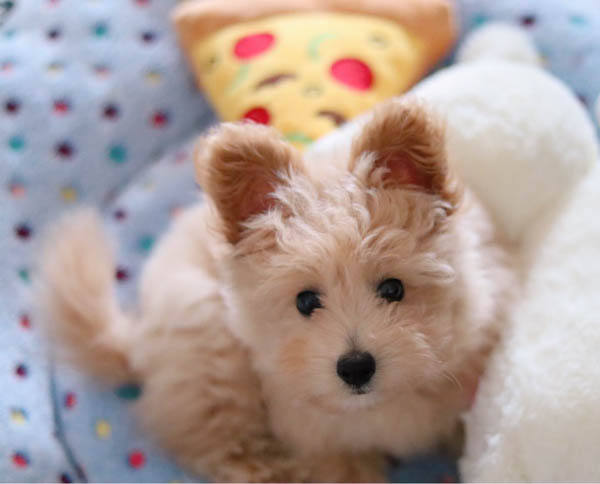
Most weigh five to fifteen pounds and stand eight to ten inches tall at the shoulder. Many can, however, be smaller or bigger. Males are often somewhat bigger than females.
- Weight (Male): 5 to 15 pounds
- Weight (Female): 5 to 15 pounds
Do Pomapoo Dog Shed?
Pomapoos are typically low-shedding breeds. However, because Pomeranians shed a lot, there’s no assurance that a Pomapoo will be low shedders.
Grooming Your Pomapoo Dog
Grooming may vary depending on the coat type your Pomapoo has, but you should plan to brush your dog regularly; Pomapoos have thick coats that can mat quickly.
The Pomapoo, like other dogs, needs constant grooming to keep happy and healthy. Grooming may differ depending on the generation of your Pomapoo cross.
However, suppose your Pomapoo is not hypoallergenic. In that case, most experts believe brushing should be done every few days to eliminate mats and tangles and remove any loose hair.
As with other poodle mixes, regular grooming appointments for a Pomapoo haircut every 6–8 weeks should keep your dog’s coat looking and feeling excellent and make it simpler to handle.
Pomapoos with poodle-like coats, on the other hand, are allergy-friendly. However, those curls do take a lot of attention, and regular brushing can help prevent matting.
On the other hand, Pomeranians have soft, thick undercoats and long, straight outside coats. And while they appear to be high-maintenance, brushing may be a simple operation due to the puppies’ tiny size.
How Often Do You Need to Bathe Pomapoo Dog?

Bathing isn’t necessary too frequently unless your Pomapoo becomes dirty. Most get by with a nice bath once every couple of weeks. When bathing your dog, use warm water and a dog-friendly shampoo and conditioner.
Brush your dog every couple of days using appropriate grooming equipment, and brush your teeth every day with a dog-safe toothbrush and toothpaste.
His nails should be clipped regularly to prevent cracking and splitting, and his ears should be cleansed and clear of buildup and dirt.
Do Pomapoo Dogs Bark a Lot?
These dogs are ideal for little houses; it is crucial to know that they are loud and might be prone to barking, especially if bored.
To assist in alleviating any troublesome habits, you may also strive to educate your Pomapoo to stop barking on command. Still, the best solution is frequently to ensure your Pomapoo is sufficiently fed.
Are Pomapoo Dogs’ Hypo Allergic?
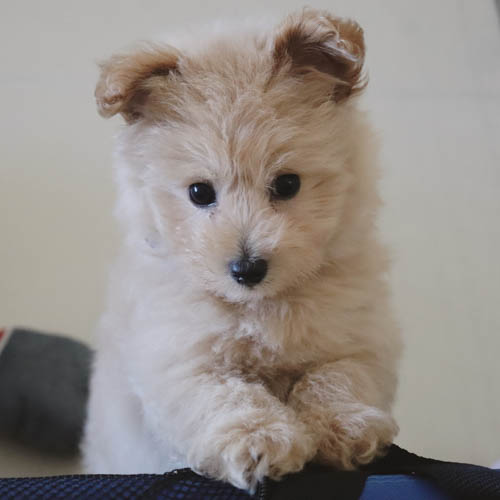
Given the impact of Poodle DNA, the Pomapoo might be a hypoallergenic designer breed. However, because the Pomeranian parent is not hypoallergenic, there is no assurance that a Pomapoo will be hypoallergenic.
The Poodle is hypoallergenic, while the Pomeranian is not. A first or second-generation Pomapoo may acquire any coat type from his parent breed and maybe a strong shedder like his Pomeranian parent or a hypoallergenic dog like his Poodle parent.
However, it is important to note that there is no such thing as a completely hypoallergenic dog. All dogs sweat; however, hypoallergenic dogs shed less and create less allergy-inducing than other breeds.
Are Pomapoo Dogs Easy to Train
Pomapoos are relatively easy to train and may make an excellent family dog for households with older children. Pomapoos are quick learners and will like training sessions since it allows them to be the focus of attention.
Prepare a variety of treats to make brief training sessions fruitful and enjoyable. Some of the main training goals for Pomapoos should be to assist them in keeping calm and refrain from barking. As with other breeds, patience and positive reinforcement should be used throughout the training.
Pomapoo dogs left alone at home for an extended period may develop separation anxiety and destructive behaviors. Potty accidents, gnawing, and barking are examples of these habits. Proper training and exercise can also aid in the reduction of these tendencies.
Pomapoo Dog Behaviour Problems
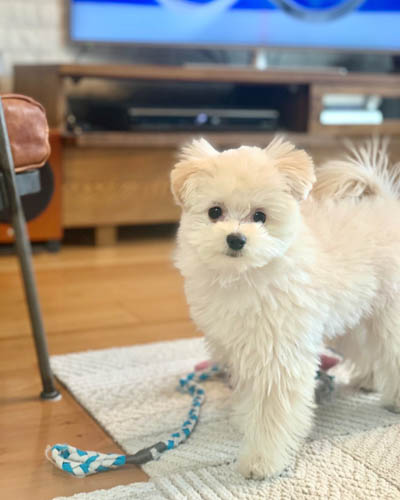
They are believed to be little dogs with enormous personalities, and they are clever and loving. Pomapoos are not usually aggressive or bashful.
They are normally quite sociable, but if their Pom parent personality is dominant, they may be a little more reserved when meeting new people. Make an effort to begin socializing as soon as possible. Allow them to meet new people, animals, and sounds.
Family Bonding
Pomapoos love all family members, but their deepest attachment is with their primary caretaker. They should not be left alone for extended periods. In this case, a second dog or cat might come in handy.
They do well in large families with children and solitary adult households. So long as kids are raised in a caring setting. They have a sweet demeanor and like snuggling with their family.
No Punishments
Pomapoos, like many little dogs, are notorious for being difficult to housetrain. You may use pee pads or even litter boxes to limit the number of accidents and recurrent training utilizing positive reinforcement methods.
Owners should avoid punishment during training since the Pomapoo is a sensitive small dog. Use rewards and praise instead, and keep training brief and game-like.
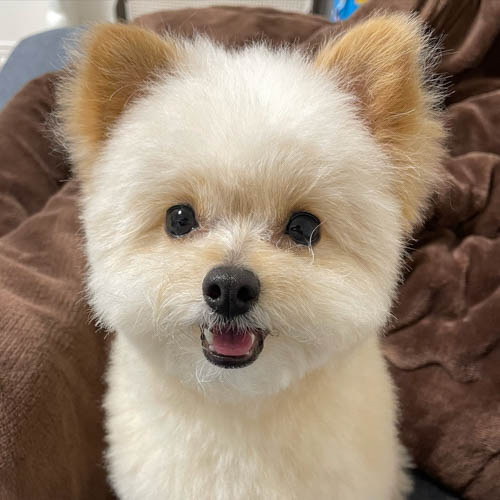
Separation Anxiety
Pomapoos become highly devoted to their owners and might experience separation anxiety if left alone at home for an extended period.
If you’re thinking about getting a Pomapoo, be prepared for a dog who is as little as a shadow. While the Pomapoo is naturally active and adventurous, he was also developed for friendship. As a result, this little dog gets highly attached to his human family and would thrive in households with children.
Socialization
When it comes to your Pomapoo, socialization is equally crucial. It is critical to properly socialize your Pomapoo.
They also like driving in cars and window-shopping; however, they are not the most patient hybrid.
To effectively socialize your dog, experts recommend introducing him to as many different noises, sights, strangers, and experiences as possible from a young age.
It is critical to establish pleasant first impressions for your Pomapoo and avoid forcing your Pomapoo to perform something that frightens him.
Forcing any dog into a setting in which they are visibly uneasy typically exacerbates the problem. It leads to further difficulties down the line.
They make wonderful miniature guard dogs, and early training and socialization can help ease some of these habits.

Toys
The Pomapoo will also like playing with puzzle toys and learning new tricks. This intelligent breed will thrive in a home with owners who value his sharp mind and are ready to channel his energy and problem-solving abilities.
It’s also a good idea to install doggie steps or a ramp in your home to assist them in jumping up on your couch. It will prevent these small pups from hurting their joints by leaping on and off furniture.
Exercise
Pomapoos do not require a lot of workouts. They can live comfortably in an apartment and make an excellent lapdogs. You will, however, need to help your pet receive some exercise in the form of brief walks or fetch activities.
Few Pomapoos will be energetic and clever dogs. As a result, if his body and intellect are not appropriately stimulated, he may be prone to misbehavior.
Make sure your Pomapoo gets enough exercise each day by taking a quick walk and playing in the backyard or even at home. Fortunately, the Pomapoo may receive enough exercise even inside the house with half-hour indoor fetch games or tug of war games.
With Other Pets
Pomapoos, being extroverts and family dogs, love the companionship of other pets, especially cats. While they will have playful streaks, their activity requirements are on the low end of the spectrum. These canines aren’t great for outside activities. They don’t perform well in severe climates, hot or cold.
Food and Nutrition of Your Pomapoo Dog
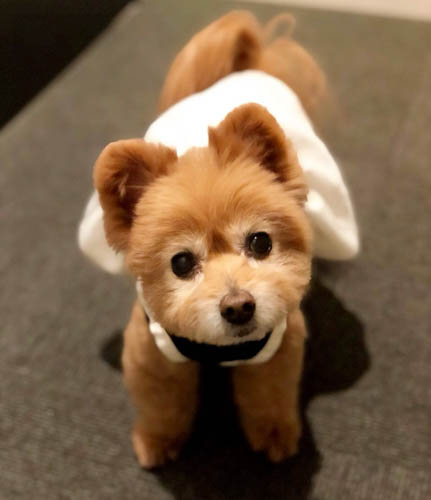
A Pomapoo diet should be designed for a tiny breed with moderate energy levels. They tend to gain weight if overfed, so keep a regular feeding schedule and don’t leave food out during the day. It is advisable to eat two to three modest meals every day.
The Pomapoo’s nutritional demands will alter from puppyhood through adulthood. They will continue to change into their senior years, as with other dogs.
Because there is just too much variance among individual dogs—including weight, energy, and health—to offer a particular prescription. You should seek your veterinarian for advice on your Pomapoo’s food.
The Health of Your Pomapoo Dog
It’s critical to ensure that you’re taking home a healthy, ethically bred Pomapoo. Because she is a new “designed” hybrid dog in high demand, some breeders may operate without regard for the dogs’ health.
The Pomapoo has 12–15 years and is a healthy mixed breed. However, like with other breeds, they might be disproportionately afflicted by certain health issues.
The purebred Poodle, in particular, is a long-lived breed with outstanding general health, which is good news for the Pomapoo. Of course, the Pomapoo, like other dogs, is susceptible to several inherited health concerns that prospective owners should be aware of.
While this is a lengthy list of health concerns. Remember that the Pomapoo is susceptible to any of his parent breeds’ inherited health disorders.
Fortunately, the Pomeranian and Poodle are both quite healthy breeds. The best way to guarantee your dog is also pretty healthy is to take preventive precautions to avoid dealing with a sick puppy or dog.
Be proactive when purchasing a dog or puppy, and ensure you acquire your pet from a reliable source.
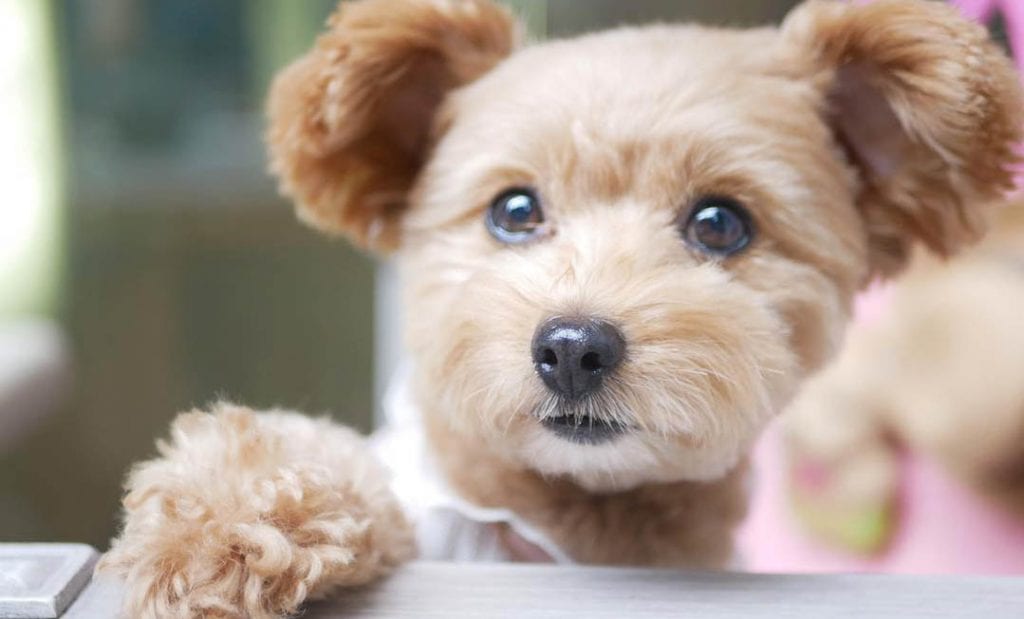
You may also want to have your Pomapoo’s health evaluated early on to have a solid understanding of any potential health concerns they may be prone to.
In addition to health screening, you may protect your Pomapoo’s health by feeding him well-balanced food. Your Pomapoo’s dog food should be designed for small breed dogs and appropriate for his age and activity level.
Pomapoos are prone to genetic health issues inherited from the toy poodle and the Pomeranian parents.
- Addison’s disease
- Thyroid Issues
- Hip Dysplasia
- Progressive Retinal Atrophy
- Collapsed Trachea
- Sebaceous Adenitis
- Epilepsy
- Legg-Calve-Perthes Disease
- Hypoglycemia
- Severe hair Loss Syndrome (SHLS)
- Luxating Patella
- Cataracts
- Dental Disease
- Obesity
How Much Does It Cost and Where to Buy or Adopt a Pomapoo Dog?
Even though the Pomapoo began as a designer breed, some have ended up in shelters or the care of rescue organizations. If you decide this is the breed for you, think about adopting it.
A Pomapoo will normally cost between $500 and $2,000 from a breeder. Pomapoos may also be available for adoption through some rescue organizations. Adopting a Pomapoo from a rescue group will cost much less, and you should budget for a few hundred dollars.
Don’t forget to factor in the cost of owning and caring for a dog. Food, supplies, and veterinary care will be required for your Pomapoo. These costs can mount up to at least $1,000 to $1,500 for the first year of ownership and $500 to $1,000 for each subsequent year.
Check your local shelters, Pomapoo rescues, or breed-specific Pomeranian or Poodle rescues since they may be able to assist in re-home mixed breeds.
Rescue and Adoption Groups
Reference
